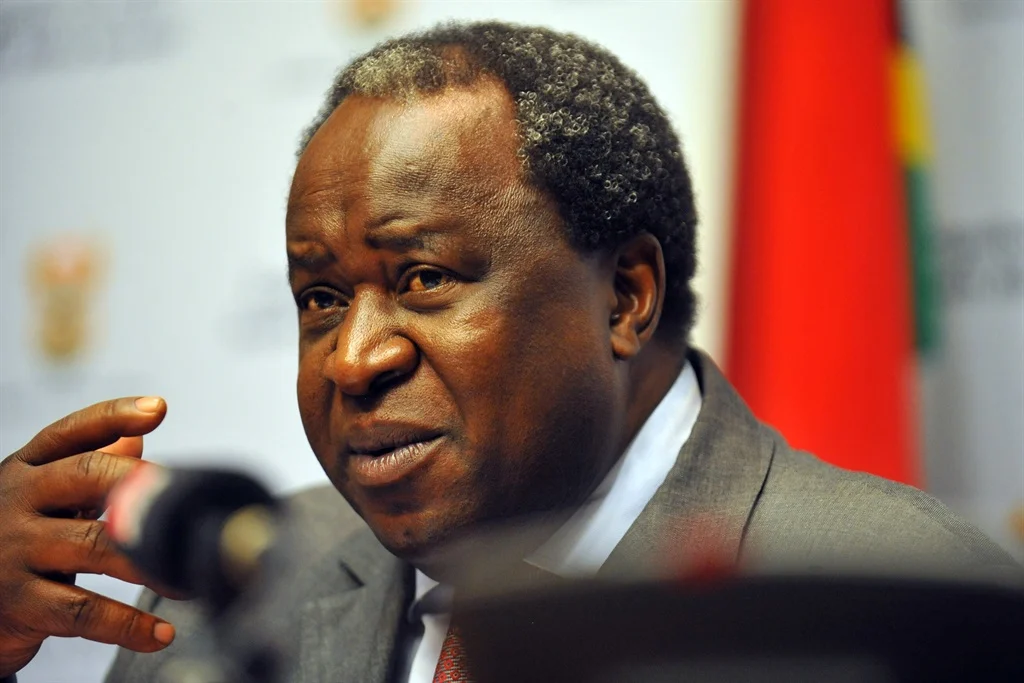Quick Facts: Tito Mboweni
| Attribute | Details |
|---|---|
| Full Name | Tito Titus Mboweni |
| Date of Birth | 16 March 1959 |
| Place of Birth | Tzaneen, Limpopo Province, South Africa |
| Date of Death | 12 October 2024 |
| Age at Death | 65 |
| Nationality | South African |
| Political Affiliation | African National Congress (ANC) |
| Education | BA (Hons) in Economics and Political Science (National University of Lesotho), MA in Development Economics (University of East Anglia) |
| Notable Roles | Minister of Finance (2018–2021), Governor of South African Reserve Bank (1999–2009), Minister of Labour (1994–1998) |
| Private Sector | International Adviser, Goldman Sachs International; Chairman, AngloGold Ashanti |
| Death | Passed away after a short illness in Johannesburg, South Africa |
Biography: Tito Mboweni
Tito Titus Mboweni (16 March 1959 – 12 October 2024) was a distinguished South African politician, economist, and advisor. He was known for his role as the Minister of Finance under President Cyril Ramaphosa from 2018 to 2021 and as the eighth Governor of the South African Reserve Bank, being the first Black South African to hold the position. Mboweni’s leadership and economic expertise left a lasting impact on South Africa’s financial and economic landscape.
Early Life and Education
Mboweni was born on 16 March 1959 in Tzaneen, Limpopo Province, and was the youngest of three children. He began his studies at the University of the North but went into exile in 1980, where he joined the African National Congress (ANC). He later earned a BA (Hons) in Economics and Political Science from the National University of Lesotho in 1985 and an MA in Development Economics from the University of East Anglia in 1988.
Political Career
Mboweni played a key role in the ANC’s economic policy development during the early 1990s. In 1994, he was appointed as South Africa’s Minister of Labour in Nelson Mandela’s cabinet, where he was instrumental in crafting the post-apartheid labor legislation, including the Labour Relations Act that established collective bargaining.
In 1998, Mboweni joined the South African Reserve Bank as the first Black advisor to the Governor. He succeeded Dr. Chris Stals as the Governor in 1999, serving until 2009. During his tenure, he implemented an inflation-targeting policy to stabilize prices and manage the rand’s volatility.
After leaving the Reserve Bank, Mboweni joined the private sector, serving as an international advisor for Goldman Sachs International and holding various directorships, including Chairman of AngloGold Ashanti.
Minister of Finance (2018–2021)
Mboweni returned to government as the Minister of Finance on 9 October 2018, following the resignation of Nhlanhla Nene. During his time in office, Mboweni often advocated for market-friendly reforms, including a 2019 economic growth plan that stirred debate within the ANC and among its alliance partners. His proposal for austerity measures and a zero-based budgeting system aimed to curb the growing fiscal deficit and avoid a debt crisis.
Mboweni resigned from the position on 5 August 2021, passing the reins to Enoch Godongwana. He then transitioned back to the private sector, becoming the chairman and an independent non-executive director of Accelerate Property Fund.
Other Activities and Recognition
Mboweni’s contributions extended beyond his political roles. He was involved in various international forums, serving as an ex-officio member of the World Bank’s Board of Governors and the Joint World Bank-IMF Development Committee during his time as Minister of Finance. His expertise earned him honorary positions at the University of South Africa, the University of Stellenbosch, and the University of the Witwatersrand.
In 2015, he was appointed as an honorary professor at the School of Economic and Business Sciences at the University of the Witwatersrand. Mboweni also served as Chancellor of the University of North-West.
Controversies
Mboweni was known for his outspoken views, including a controversial proposal in 2020 for a federal union between South Africa and Lesotho, which received mixed reactions. Additionally, his remarks on the dismissal of the Bank of Zambia’s governor led to a reprimand from President Cyril Ramaphosa, emphasizing the importance of respecting central bank independence.
Death
Tito Mboweni passed away on 12 October 2024 in a Johannesburg hospital after a brief illness. His death marked the end of a notable career that spanned across public service and the private sector. Mboweni is remembered for his dedication to economic reform, his leadership at the Reserve Bank, and his willingness to challenge conventional approaches to South Africa’s economic challenges.

